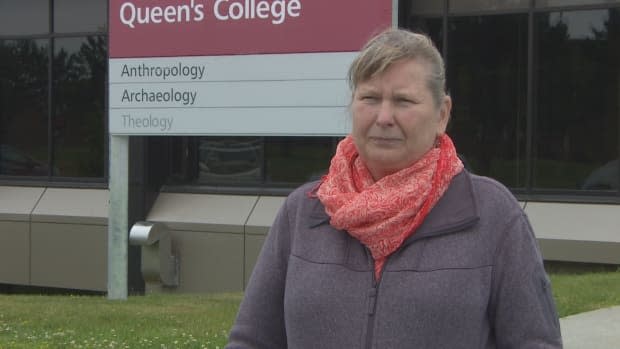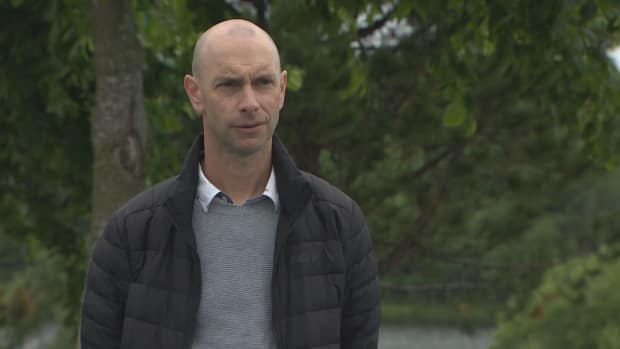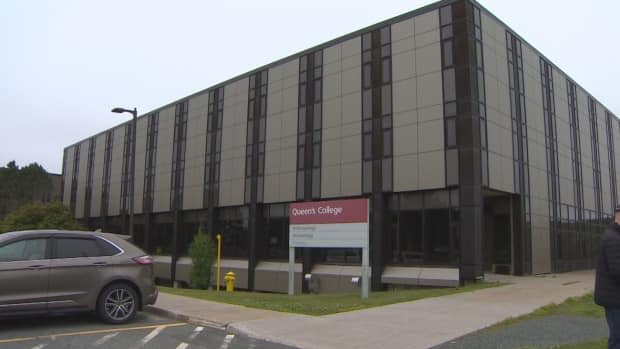MUN archaeology team offering to help Indigenous communities investigate unmarked graves


WARNING: This story contains details some readers may find distressing.
A newly formed working group within Memorial University's archeology department is offering help to Indigenous communities that may want to investigate potential unmarked graves in Newfoundland and Labrador.
After the discovery of human remains in unmarked graves at former residential schools in other parts of Canada, archeology professor Lisa Rankin said she knew questions would likely arise in local Indigenous communities about possible sites in this province.
Rankin, MUN's research chair of Indigenous Community Archeology, said she and her colleagues have begun working with Indigenous groups to see how they could be of service.
"We're just working through that now," Rankin said last week. "We're here to help them if they want our help."
Rankin said the team is made up of eight people with different skill sets, from archaeologists and historical researchers to community representatives from the Innu Nation and the NunatuKavut Community Council.
She said the early stages of planning have been working to make sure proper supports for research are in place and making information available to groups who may want to do research of their own.

"We don't want to say 'Hey, we're ready to go' … If the communities decide that they want to know more information about a known cemetery where there may be graves, for example, we're ready and we will help them," she said.
"These are huge community questions. They need to be talked through in the communities and understood in the communities, and I believe that's a process that is going on now. We're just in the background ready to help."
Do you have information about residential schools? Email your tips to WhereAreThey@cbc.ca
That conversation has already started for NunatKavut's director of research, education and culture, Bryn Wood. He said preliminary background research is underway, and the next step is to consult with community members.
"It's important for us to be involved and to make sure that we collaborate with people who are familiar with best practices to support our communities and others in efforts on finding lost children," he said.
The Nunatsiavut government is not participating in the working group at this time. Members of Nunatsiavut and the Innu Nation were unavailable to comment about the working group.
N.L. results could differ from other parts of Canada
Rankin said each community's needs could be different, since each had different experiences.
She said that could also translate to different results than other parts of Canada. In Newfoundland and Labrador, research concerns former residential schools students, and also Indigenous people who died in hospital in Newfoundland whose bodies were never returned.
"The more significant issue for Indigenous communities in Newfoundland and Labrador may be lost loved ones that went to hospital care in the south in, say, St. Anthony, for example, and never came home," Rankin said.
The Nunatsiavut government participates in a program called Nanilavut, an Inuktitut word meaning "let's find them." Nanilavut's researchers seek the remains and burial sites of Inuit sent south for tuberculosis treatment in 1940s, '50s and '60s.

Newfoundland and Labrador had five residential schools, the last of which closed in 1980. Rankin said given the amount of people living with memories of the schools, research efforts and record-keeping could be different in this province.
"There may be better records about anyone who lost their life at the schools, and about where those people might be," she said.
"It's only a generation away that this had long-term, lasting impacts for our membership and other communities," added Wood.
"So we were really just scratching the surface, I think. It's time to make sure that this work is done in a respectful and meaningful way, using best practices. And I think this committee is a good step in that direction," he said.
High-tech tools
If a request to investigate an unmarked grave was made, the working group could use technology called ground penetrating radar (GPR) to begin its search, according to MUN associate archeology professor Vaughan Grimes.
The radar, which Grimes says is about the size of a lawnmower, works as a non-invasive technique that can determine changes within soil. It can show changes related to water content or other organic material, which can be interpreted to show subtle differences between altered and unaltered soil.
However, he said using GPR can be challenging in Newfoundland thanks to the island's terrain.
"A lot of [the terrain] has GPR noise sources like rocks and roots and things like that. So there are inherent challenges to using it in many of the environments in which we have here in Newfoundland," Grimes said.
"In Labrador, there are places where the soil is actually quite uniform … because they are uniform, it means that any disturbances will strike a more obvious contrast."
With the team's work still in development, Rankin said the working group's next steps are still unclear.
"I hope that it plays out the way they want it to, and they get some chance to heal from this," she said. "Here in Newfoundland and Labrador, I think we have more work to do yet to figure out what this situation is going to be. But there's no rush."
Support is available for anyone affected by the lingering effects of residential school and those who are triggered by the latest reports.
A national Indian Residential School Crisis Line has been set up to provide support for residential school survivors and others affected. People can access emotional and crisis referral services by calling the 24-hour national crisis line: 1-866-925-4419.
Do you have information about unmarked graves, children who never came home or residential school staff and operations? Email your tips to CBC's new Indigenous-led team investigating residential schools: WhereAreThey@cbc.ca.

